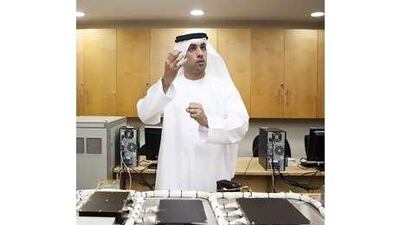In a small room on the outskirts of Dubai at the Emirates Institute for Advanced Science and Technology (EIAST), a large television screen shows a countdown in seconds. Other screens show an array of maps, sensor readings and other mathematical data.
This is mission control for DubaiSat-1. The satellite, which was launched in July last year, is the Emirates' first remote imaging satellite and one of the major projects in the UAE's emerging space industry. In a few seconds, the satellite will cross over the Gulf and provide a window for engineers to download important image data. As the satellite orbits 690km above Earth, time is of the essence.
Back on Earth, Salem Humaid al Marri, the space programme project manager for EIAST, walks over to a computer monitor that displays raw images from the satellite in basic black and white. "Ah, it's no good," he says, pointing at a group of seemingly innocuous white dots next to what appears to be the cluster of man-made islands called the World. "See that? Those are clouds. Any obstruction ruins the image and we can't really use them."
Apart from when someone is trying to locate their house, satellite imagery may not seem interesting. But each image can be analysed in a variety of ways, giving users including scientists and urban planners a bird's-eye view of what is going on. After its launch from Baikonur in Kazakhstan, DubaiSat-1 was immediately put to work beaming down images of Dubai. UAE universities have used imagery from the satellite for such purposes as monitoring shoreline erosion.
The satellite is a geek's dream, filled with space-ready gadgets such as accelerometers, gyroscopes, antennas, cameras and solar energy panels. Surprisingly, the on-board computer that manages camera imagery data is 15 years old, and the processor is just powerful enough to perform key tasks. While providing satellite imagery to the Dubai Government is the main business of DubaiSat-1, commercial applications are being discovered. Mr al Marri points out that companies are increasingly approaching EIAST to request certain images as well as leasing time on the institute's terrestrial antenna in case there is immediate need for data from another satellite orbiting over Dubai.
"Our goal is not to go commercial, but if there's a chance to commercialise our data, it's a bonus. Our goal is to serve the government needs in terms of what the municipality wants," Mr al Marri says. "But if you're dedicated to commercialisation and you've got a satellite, you can make a lot of money." For now, the US$50 million (Dh183.7m) satellite project is a vital part of the UAE's space plans in what is expected to be a major industry in the Emirates during the next 20 years.
The UAE already has Thuraya, a telecommunications company with two orbiting satellites relaying voice and broadband data. The company plans next year to launch Yahsat, an internet and television satellite aimed at covering the Middle East and Africa. Aabar Investments, which is owned by the Abu Dhabi Government, has also moved into the space business. The company has taken a 32 per cent stake in Virgin Group's commercial space enterprise, Virgin Galactic, at a cost of about $280m and holds the exclusive regional rights for any Virgin spaceport that is to be built here.
"If you look at the UAE in terms of the region, it's one of the most advanced economies when it comes to space technology," Mr al Marri says, adding that the future for the DubaiSat programme is bright. Two more satellites are scheduled to be added to EIAST's fleet during the next five years, with the second to be built entirely in Dubai. The new satellites will have better picture resolution, greater data transmission capacity and propulsion systems to allow mission control to change their orbits.
"The main aspect of the DubaiSat project was technology transfer," Mr al Marri says. "For the first model, we sent … engineers to South Korea and they worked on all aspects of the satellite from design to launch. So we're trying to gain these skills and give UAE nationals the opportunity to come back to Dubai and build better satellites." @Email:dgeorgecosh@thenational.ae

